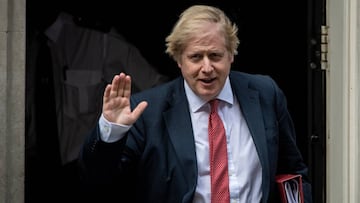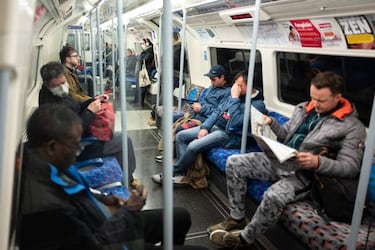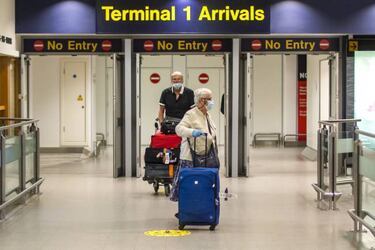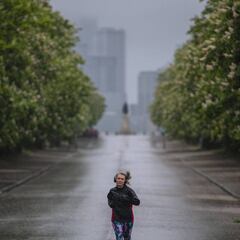Coronavirus UK: What is in the government’s 50-page lockdown guidelines?
Following Boris Johnson’s speech on Sunday a 50-page government document published on Monday gives further details on what UK citizens can and can’t do.


The UK government have released ‘Our Plan to Rebuild’ with guidelines on how to stick to the current social distancing measures. The measures, part of ‘Step One’ in the government’s roadmap, will come into force from Wednesday 13 May in England.
Work
“For the foreseeable future, workers should continue to work from home rather than their normal physical workplace, wherever possible…. All workers who cannot work from home should travel to work if their workplace is open.”
Boris Johnson said in his statement on Sunday evening that he wished to change the emphasis of the government’s message to encourage people to return to work where possible. He asked workers to reduce use of public transport and to cycle or walk to work to prevent spread of infection.
Mr Johnson said that workers in sectors like food production, construction and manufacturing “should be actively encouraged to go to work”. The specifics of government’s new ‘Covid-19 Secure’ workplace guidelines will be published later this week.
Schools
Everyone has a role to play in helping to control the virus by staying alert and following the rules.
— Boris Johnson (@BorisJohnson) May 10, 2020
This is how we can continue to save lives as we start to recover from coronavirus.#StayAlert pic.twitter.com/2z9yl1Fxs4
“The rate of infection remains too high to allow the reopening of schools for all pupils yet.... But there is a large societal benefit from vulnerable children, or the children of critical workers, attending school: local authorities and schools should therefore urge more children who would benefit from attending in person to do so.”
For now only vulnerable children (such as children in need, or those with an Education Health and Care plan) and the children of critical workers are to attend school. Paid childcare is also now permitted, to enable more working parents to return to work.
Travel
“When travelling everybody (including critical workers) should continue to avoid public transport wherever possible… Social distancing guidance on public transport must be followed rigorously. As with workplaces, transport operators should follow appropriate guidance to make their services Covid-19 Secure; this will be published this week.”
Public transport will be a major barrier to continued social distancing as more of the UK returns to work and the government’s document encourages people to cycle, walk or drive if possible. Further guidance is being published later this week along with details of increased funding for widened pavements and pop-up cycle lanes to help facilitate the switch.
Face-coverings

“The Government is now advising that people should aim to wear a face-covering in enclosed spaces where social distancing is not always possible and they come into contact with others that they do not normally meet, for example on public transport or in some shops.”
To compensate for greater travelling and greater risk of spreading infection the government is encouraging people to use homemade cloth face-coverings when leaving the house to help reduce the risk of transmission. The primary aim of face-coverings is to prevent the wearer passing on the virus, rather than stopping them contracting it.
Public Spaces
“People may exercise outside as many times each day as they wish… People may drive to outdoor open spaces irrespective of distance, so long as they respect social distancing guidance while they are there.”
The Scientific Advisory Group for Emergencies (SAGE) has advised the government that the risk of infection is significantly lower outside than inside, so some of the restrictions have been eased. People may now play sport with someone from outside their household, but only with one person and in a clear outdoor space.
Mr Johnson’s speech on Sunday drew criticism from Welsh First Minister Mike Drakeford for allowing people to drive to other destinations for exercise. The document released on Monday added that people must not travel to different parts of the UK with different guidelines, such as to Scotland, Wales and Northern Ireland.
Protecting the Clinically Vulnerable

“Those in the clinically extremely vulnerable group are strongly advised to stay at home at all times and avoid any face-to-face contact; this is called ‘shielding’. It means not leaving the house or attending gatherings at all, with very limited exceptions.”
Previously the “shielding” advice had been extended to all those over 70, those with specific chronic pre-existing conditions and pregnant women but the government has eased the guidelines slightly.
The prolonged period of shielding can be extremely difficult for those living on their own and the document outlines some steps being taken to help those shielding. Food box deliveries, priority access to supermarket delivery services and greater volunteer support are all being made available through the GOV.UK website.
General Measures
Related stories
The document also makes reference to more stringent enforcement measures which were fully revealed in Mr Johnson’s speech to the House of Commons on Monday afternoon. He announced that the minimum fine was to rise to £100; reduced to £50 if paid with 14 days.
All international arrivals (except those on a short list of exemptions) will be required to self-isolate in their accommodation for fourteen days on arrival. They will also be required to supply their contact and accommodation information and advised to download and use the NHS contact tracing app.
See also
- US stimulus checks: how to get your payment faster
- Where to claim unemployment benefits in the US: phone, online
Live coverage of the coronavirus pandemic
You can follow the latest developments in the coronavirus crisis with our daily live blog.

